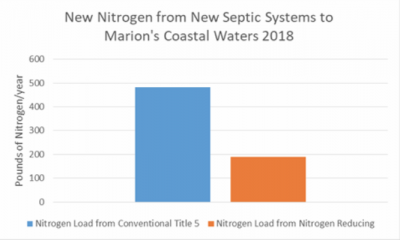Marion needs new regulations of septic systems
To the Editor:
Sippican Harbor, Aucoot Cove, and the Wewantic River in Marion are not improving in health. More and more nitrogen is finding its way into our waters. When nitrogen pollutes the water, our waters become cloudy and murky and algae begin to grow. Algae growth leads to the loss of eelgrass and less oxygen in the water. The result is our fish and shellfish begin to disappear.
As I talk with people in Marion, I consistently hear how important clean water is to our joy of living in a beautiful community. They want to know, how can they help?
Every home owner can help by limiting the amount of your sewerage and fertilizer that finds its way to our coves, harbors and rivers.
Solving the fertilizer problem is simple: don’t use any until you or your landscaper have had your soil tested and know what specific improvement is needed. Don’t let your hired landscaper use a one size fits all solution. Have them test your soil before they add any fertilizer. If you do choose to use fertilizer, use an organic slow-release fertilizer.
The largest single source of nitrogen pollution to our coastal waters is residential septic systems. Most residents feel good when they upgrade their old septic systems to a Title V approved system. Unfortunately, the new Title V system continues to pollute our water. Title V rules were written to prevent bacteria contamination of drinking water, but they do little to protect our coastal waters from nitrogen pollution. In Marion, as in other waterfront communities, the majority of the nitrogen from our septic systems is making its way to our beloved coastal waters.
To reduce pollution, the Marion Board of Health is considering a regulation for new septic systems and failed systems identified at the time of sale. The regulation would require these systems to install an approved denitrification septic system that decreases the nitrogen by at least 50% over a Title V system. With this minor change, we will stop hundreds of pounds of new nitrogen from entering our waters every year. Wareham and Tisbury have already adopted this regulation to reduce future pollution.
If this regulation had been in effect in 2018, it would have prevented approximately 300 pounds of nitrogen from entering our waters in that year alone. This graph is based on calculated nitrogen loads from just the 10 new systems installed in Marion in 2018.
While the new regulation will initially apply only to new construction and failed systems at the time of transfer, we encourage current residents to have their septic systems inspected and, if their system is not performing, to consider upgrading to one of these denitrification systems.
The Board of Health will hold a workshop on Saturday March 21 from 9 to 11 a.m. in the conference room at Town Hall in Marion led by George Heufelder, manager of the Massachusetts
Alternative Septic System Test Center in Barnstable County for any residents interested in learning about denitrification systems. A public hearing will be held on the proposed regulation by the Board of Health at their meeting on April 21, 2020.
Questions? Call the Marion Board of Health at 508-748-3530
The Marion Board of Health














